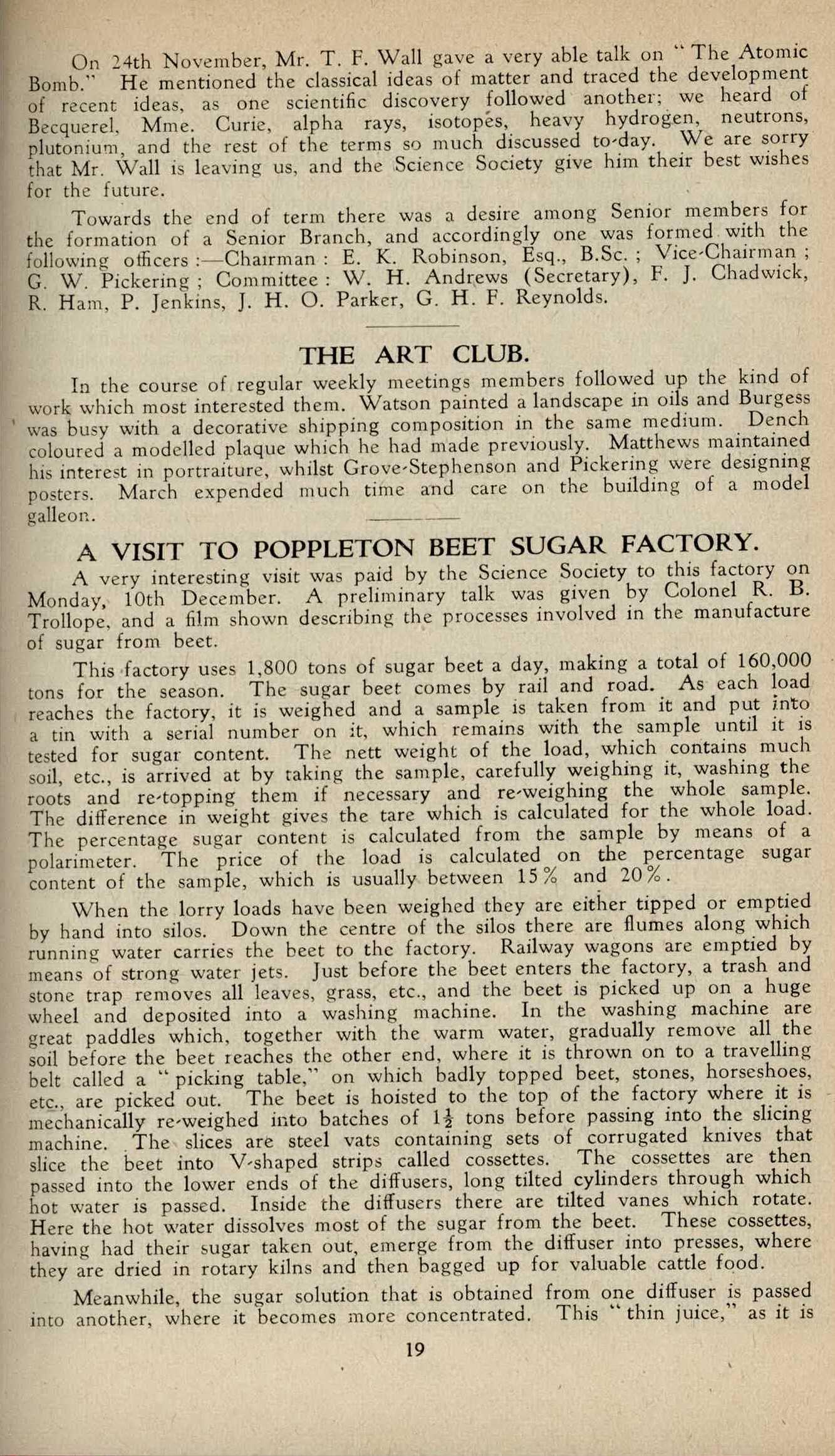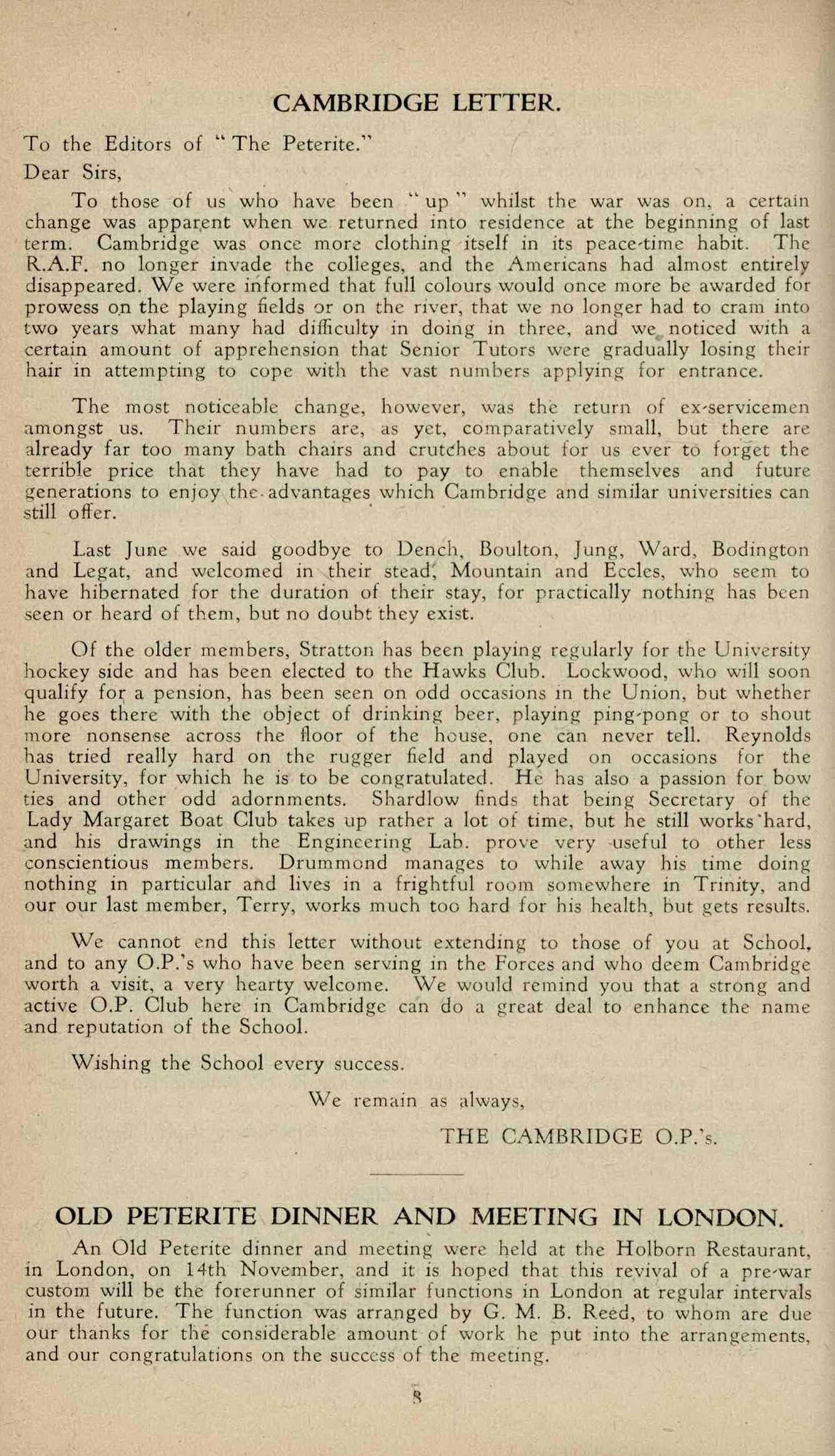
31 minute read
Old Peterite Dinner and Meeting in London
from Feb 1946
by StPetersYork
To the Editors of " The Peterite." Dear Sirs,
To those of us who have been " up " whilst the war was on, a certain change was appar,ent when we returned into residence at the beginning of last term. Cambridge was once more clothing itself in its peace-time habit. The R.A.F. no longer invade the colleges, and the Americans had almost entirely disappeared. We were informed that full colours would once more be awarded for prowess on the playing fields or on the river, that we no longer had to cram into two years what many had difficulty in doing in three, and we, noticed with a certain amount of apprehension that Senior Tutors were gradually losing their hair in attempting to cope with the vast numbers applying for entrance.
The most noticeable change, however, was the return of ex-servicemen amongst us. Their numbers are, as yet, comparatively small, but there are already far too many bath chairs and crutches about for us ever to foriet the terrible price that they have had to pay to enable themselves and future generations to enjoy the. advantages which Cambridge and similar universities can still offer.
Last June we said goodbye to Dench, Boulton, Jung, Ward, Bodington and Legat, and welcomed in their stead; Mountain and Eccles, who seem to have hibernated for the duration of their stay, for practically nothing has been seen or heard of them, but no doubt they exist.
Of the older members, Stratton has been playing regularly for the University hockey side and has been elected to the Hawks Club. Lockwood, who will soon qualify fo{ a pension, has been seen on odd occasions in the Union, but whether he goes there with the object of drinking beer, playing ping•pong or to shout more nonsense across the floor of the house, one can never tell. Reynolds has tried really hard on the rugger field and played on occasions for the University, for which he is to be congratulated. He has also a passion for bow ties and other odd adornments. Shardlow finds that being Secretary of the Lady Margaret Boat Club takes up rather a lot of time, but he still works'hard, and his drawings in the Engineering Lab. prove very -useful to other less conscientious members. Drummond manages to while away his time doing nothing in particular and lives in a frightful room somewhere in Trinity, and our our last member, Terry, works much too hard for his health, but gets results.
We cannot end this letter without extending to those of you at School, and to any O.P.'s who have been serving in the Forces and who deem Cambridge worth a visit, a very hearty welcome. We would remind you that a strong and active O.P. Club here in Cambridge can do a great deal to enhance the name and reputation of the School.
Wishing the School every success. We remain as always, THE CAMBRIDGE O.P.'s.
OLD PETERITE DINNER AND MEETING IN LONDON.
An Old Peterite dinner and meeting were held at the Holborn Restaurant, in London, on 14th November, and it is hoped that this revival of a pre-war custom will be the forerunner of Similar functions in London at regular intervals in the future. The function was arranged by G. M. B. Reed, to whom are due our thanks for the considerable amount of work he put into the arrangements, and our congratulations on the success of the meeting.
Forty-one Old Peterites attended, together with the Dean of York, who, as Chairman of the Governors of the School, was the principal guest, the Headmaster, Mr. S. M. Toyne and C. S. Shepherd, the preseht Head of the School. It is particularly noteworthy that representatives of almost every surviving generation were present.
The Dean made a very interesting and stimulating speech, in the course of which he emphasised the ultimate dependence of a school on its Old Boys. He explained the reasons for the Governors' decision that the School should revert to Independent status, and predicted a period of prosperity for the School, with a still further and progressive advance in academic achievement. The Dean spoke of the necessity for financial support if the large-scale building schemes are to be put into operation, and especially commended the School as a suitable testamentary beneficiary.
After a number of short speeches, in the course of which the Dean was warmly thanked for coming to the dinner, and for his encouraging survey, the Headmaster took the chair at the business meeting which followed. In response to many requests, the Headmaster gave a brief account of the present position of the School, with particular reference to the plans for new buildings. A memorandum was distributed, of which a summary is given elsewhere in this issue.
The meeting approved the decision registered at the O.P. meeting last June that the new Dining Hall should form the School's War Memorial. It was mentioned that a general appeal was to be launched early in the New Year.
The Headmaster also announced that the 1946 Commemoration would revert to peace-time dates, namely, the last week-end in July, and it was hoped that one of the principal features of the Commemoration would be a large re-union, of Old Peterites at the School. In response to many suggestions, the Headmaster undertook to try to provide accommodation in York for Old Peterites who were able to attend the Commemoration.
A discussion took place on the question of membership subscriptions to the Old Peterite Club. Mr. H. L. Creer, the Treasurer of the Club, pointed out that the principal expenditure which had to be met was in respect of the School magazine. He proposed that the magazine should be sent terminally by the School to every Old Peterite, and that if the Governors of the School were willing to accept financial responsibility for this, a single life membership subscription of £5 should be instituted instead of the present system. It was pointed out by Mr. Creer and other speakers that this system would have the great advantage of ensuring that every boy on leaving School had the opportunity of becoming a life member of the Club, and the fact that each Old Boy would automatically receive a copy of the School magazine every term would, it was felt, maintain a closer bond between the School and its Old Boys. Mr. Creer also proposed that if the foregoing plan was adopted, the balance of the income of the Club, after deducting expenses, would be available for the School. This proposal was unanimously adopted by the meeting, and it was resolved to bring the resolution forward to the general meeting next July for confirmation. (Since the meeting, the Headmaster had consulted the Governors of the School, who have agreed to the scheme in principle.)
Discussion ranged over many other subjects, including the question of School publicity, and it was felt by everyone present that the meeting was most successful and helpful.
The following is a list of the Old Peterites who were present :— Boulton, T. B., The Rise,' 1940.43. Burdon, T. H., The Grove, 1922-26. Buck, L. A., School House, 1909-13. Chapman, • J. B. 0., St. Olave's and Buckler, F. N., St. Olave's and School School House, 1919 - 27. House, 1930-42.
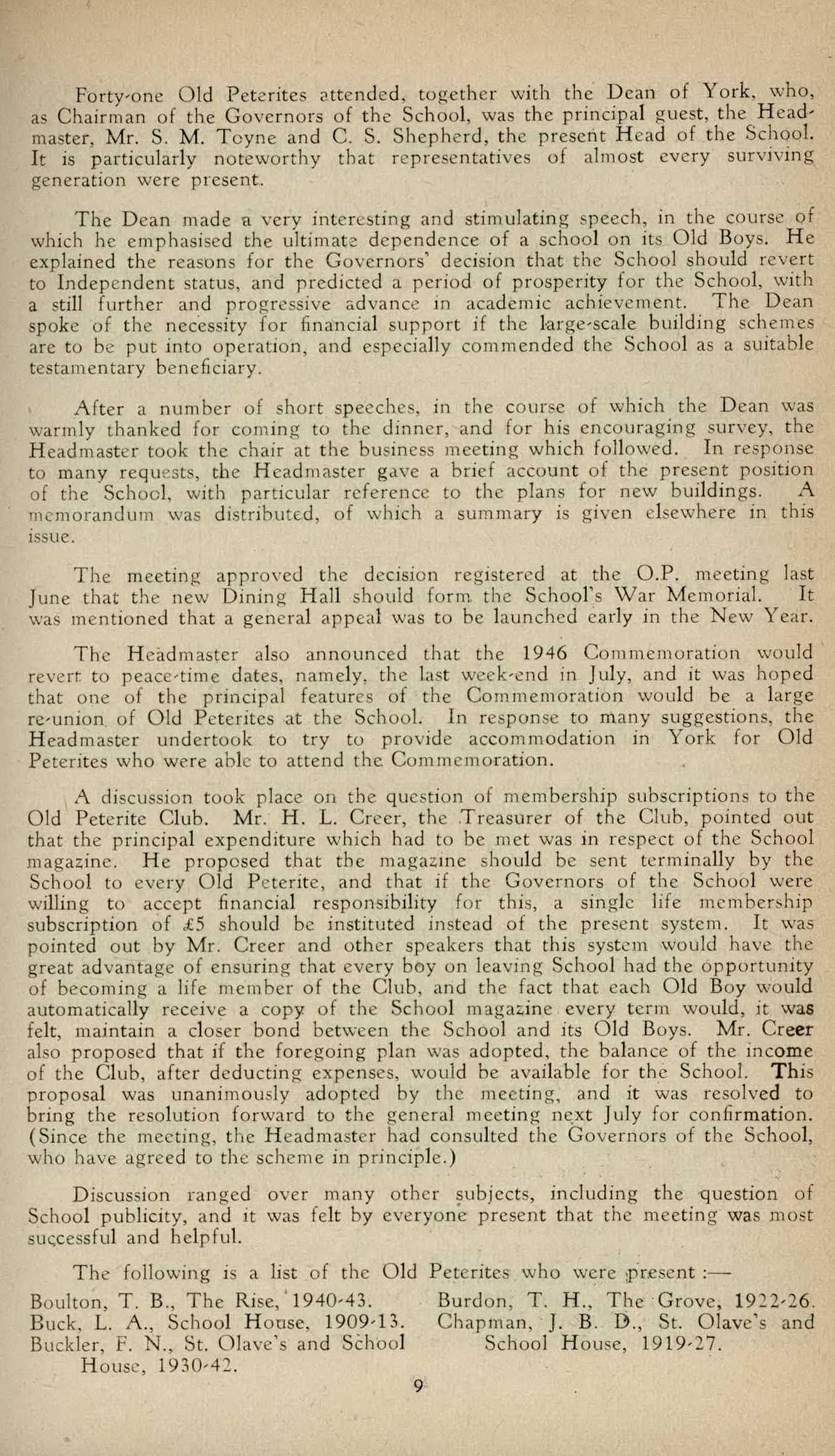
Chapman, K. H., St: Olave's and
School House, 1922-25. Chilman, H. L., School House, 190914. Crawshaw, H. G., The Rise, 1915-21. Greer, H. L., Dayboys, 1893-98. Dench, P. G. R., St. Olave's and
Temple, 1932-38. Dixon, R. S., School House, 1934-38. Dobree, N. R., The Grove, 1920-26. Dodd, D. F., School House, 1928-32. Dodd, N. L., School House, 1931-35. Duffield, F. L., St. Olave's and The
Rise, 1936-43. Easten, G. P., The Manor. Easten, J. A., School House. Fairweather, C. C., The Manor, 1921-22.. Gedge, J. B., Dayboys, 1916-19. Graham, P. R. G., School House, 1935-40. Harland, M. W., School House, 1912-14. Jones, F., School House, 1908-11. Killick, C. N. S., School House, 1935-39. Lockwood, P. A., St. Olave's and
School House, 1935-42. Millhouse, G., School House, 1912-13. Penty, J. R., St. Olave's and The Rise, 1935-44. Pick, M., 1902-08. Ping, W. H. Wentworth, St. Olave's and The Rise, 1932-42. Potter, F. H. (Master). Pryer, R. R. L., School House, 1937-42. Reed, G. B. M., The Grove, 1909-14. Reynolds, G. E. K., St. Olave's and
Temple, 1932-42. Ringrose, P. F., School House, 194044. Rodgers, J., Dayboys, 1919-25. Scott, H. C., Dayboys, 1898-1902. Shadwell, C., School House, 1910-14. Tendall, G. F., Master, 1914-19. Thomas, H. H., School House, 1927. Thompson, A. P., The Rise, 1920-26. Waddington, F. R., 1914-15. Wall, L. J. L., School House, 1927-30.
OLD PETERITE MASONIC LODGE.
It has been suggested that an Old Peterite Masonic Lodge should be formed, and Old Peterites who would be interested in such a project are requested to write as soon as possible to Brigadier C. C. Fairweather, 33 Leeds • Road, Harrogate. Details would be discussed at a special meeting to be called as soon as the list of proposed Founders is completed.
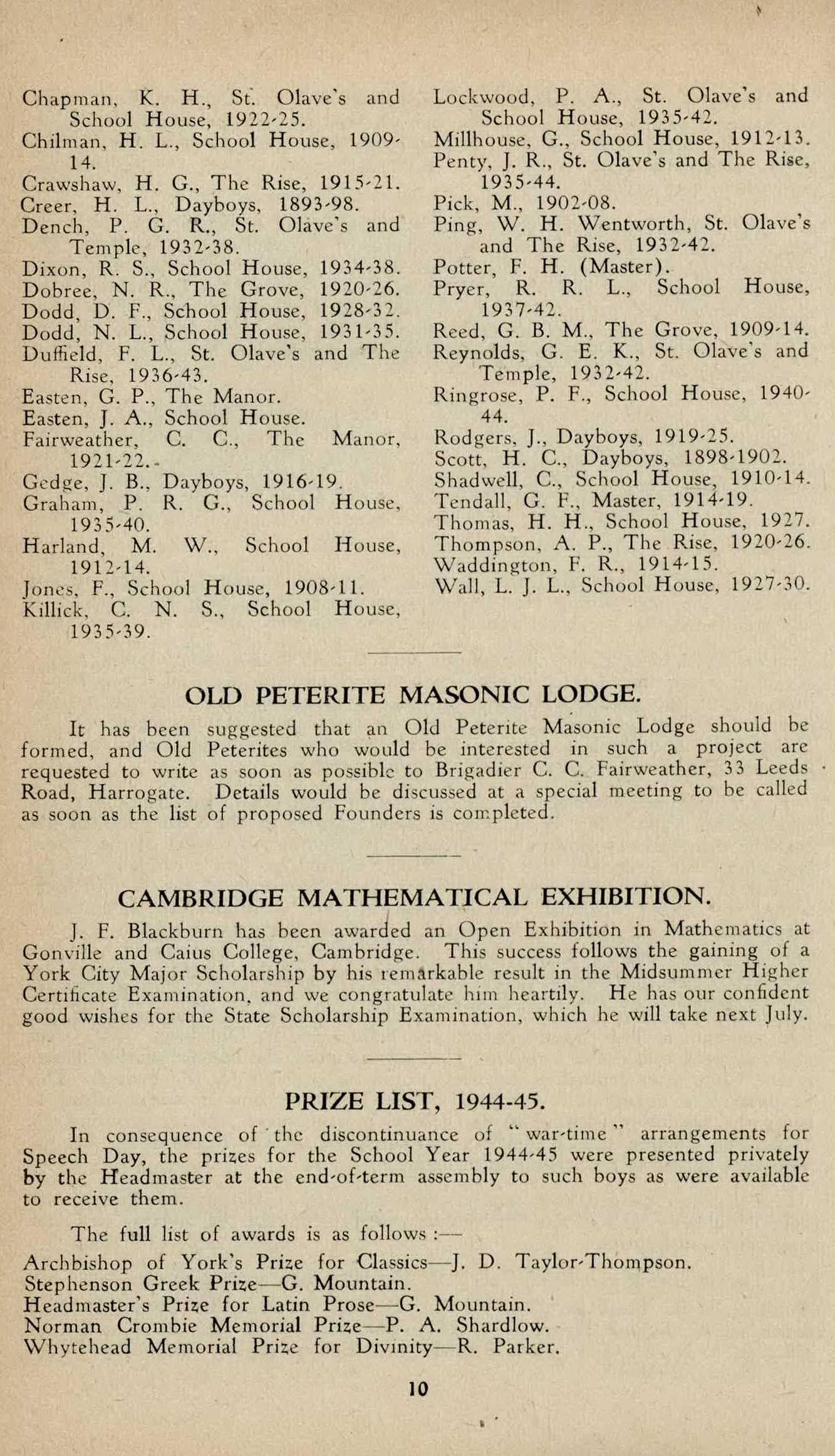
CAMBRIDGE MATHEMATICAL EXHIBITION.
J. F. Blackburn has been awarded an Open Exhibition in Mathematics at Gonville and Caius College, Cambridge. This success follows the gaining of a York City Major Scholarship by his remarkable result in the Midsummer Higher Certificate Examination, and we congratulate him heartily. He has our confident good wishes for the State Scholarship Examination, which he will take next July.
PRIZE LIST, 1944 -45.
In consequence of the discontinuance of " war-time " arrangements for Speech Day, the prizes for the School Year 1944.45 were presented privately by the Headmaster at the end-of-term assembly to such boys as were available to receive them.
The full list of awards is as follows :- Archbishop of York's Prize for Classics-J. D. Taylor-Thompson. Stephenson Greek Prize-G. Mountain. Headmaster's Prize for Latin Prose-G. Mountain. Norman Crombie Memorial Prize-P. A. Shardlow. Whytehead Memorial Prize for Divinity-R. Parker.
General Knowledge Prizes :
Sixth Form—J. D. Eccles.
Below the Sixth—G. C. I. Harker. Needham Prize for Architecture--J. C. Grove•Stephenson and D. O.P. Club Reading Prizes :
Senior—J. D. Taylor-Thompson.
Junior—C. K. Hudson. Music Prizes :
Senior—I. T. R. Welch.
Junior—R. Ham. Art Prize—T. H. French. Modern Language Prize—P. B. Toyer. B.M.A. Medal for Science—J. F. Spink. Dean of York's Prize for Mathematics—J. F. Blackburn. Middle School Essay Prizes—J. S. Trewick and G. Spence. Form Prizes :
IVa—C. D. Ryder.
IVb—G. C. Greetham.
IVc—A. L. Pavis.
Shell A—R. J. Gibson.
Shell B—M. A. Dawson. J. Pallant.
VALETE AND SALVETE.
VALETE (December, 1945). THE MANOR. M. J. Bealing 1944.45 (St. Olave's, 1940-44). IVc. Cadet in J.T.C. E. 0. Owen. 1943-45. Upper VI. THE RISE. P. W. Ellis. 1944-45. Vc. School Play, 1944. M. F. Flint. 1945 (St. Olave's, 1941). 1Va. W. H. Jackson. 1945 (St. Olave's, 1941). Shell. C. S. F. Robertson. 1945. Vb.
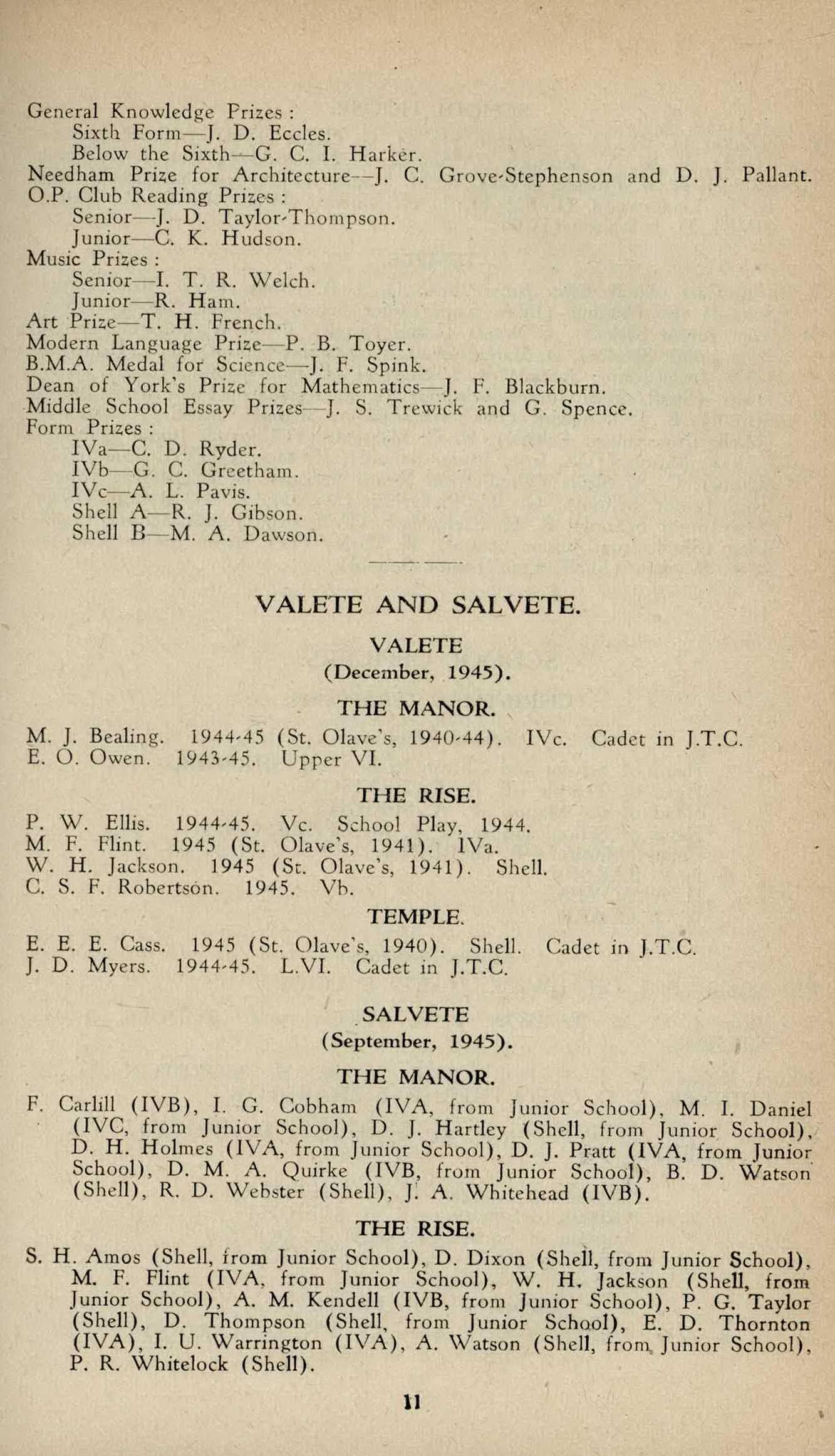
TEMPLE. E. E. E. Cass. 1945 (St. Olave's, 1940). Shell. Cadet in J.T.C. J. D. Myers. 1944-45. L.VI. Cadet in J.T.C.
.SALVETE (September, 1945). THE MANOR. F. Carlill (IVB), I. G. Cobham (IVA, from Junior School), M. I. Daniel (IVC, from Junior School), D. J. Hartley (Shell, from Junior . School),
D. H. Holmes (IVA, from Junior School), D. J. Pratt (IVA, from Junior
School), D. M. A. Quirke (IVB, from Junior School), B. D. Watson (Shell), R. D. Webster (Shell), J: A. Whitehead (IVB). THE RISE. S. H. Amos (Shell, from Junior School), D. Dixon (Shell, from Junior School),
M. F. Flint (IVA, from Junior School), W. H. Jackson (Shell, from
Junior School), A. M. Kendell (IVB, from Junior School), P. G. Taylor (Shell), D. Thompson (Shell, from Junior School), E. D. Thornton (IVA), I. U. Warrington (IVA), A. Watson (Shell, from, Junior School),
P. R. Whitelock (Shell).
SCHOOL HOUSE. P. T. Baker (IVB), H. Chatterton (IVA), G. Elliott (IVB.), J. F. N. Jackson (IVB), P. W. V. Milburn (IVA), D. P. Norwood (L.VI), J. D. Poole (Shell). R. B. Pringle (IVA), R. M. Stanley (IVA, from Junior School),
R. E. Underwood (IVB), M. I. H. Unwin (IVA), B. D. C. Walker (IVB), D. J. Wilson (IVB).
TEMPLE. E. E. E. Cass (Shell,• from Junior School), J. R. Dwyer (IVA, from Junior
School), D. Fletcher (IVA, from Junior School), A. A. Greaves (IVA, from Junior School), C. W. D. Green (Shell), P. V, W. Gunning (Shell, from Junior School), D. Haley (Shell, from Junior School), D. L. Hourigan (IVB, from Junior School), R. I. Hunt (IVA, from Junior School), G. A.
Jewitt (Shell, from Junior School), M. E. Kershaw (IVA, from Junior
School), B. J. Longstaff (IVC, from Junior School), M. E. V. Marshall (Shell, from Junior School), R. C.- Marshall- (IVC, from Junior School),
P. J. R. Mason (IVA, from Junior School), H. Murray (IVA, from Junior
School), C. A. Neale (Shell, from Junior School), D. J. Osborne (Shell, from Junior School), G. W. Pickering (L. VI), R. G. Relton (IVC, from Junior School), R. H. Richardson (IVB, from Junior School), I. R.
Riley (Shell, from Junior School), K. Varley (IVC, from Junior School),
R. F. Wyman (Shell, from Junior School).
SCHOOL OFFICERS.
CHRISTMAS TERM, 1945. School Monitors : Head of School and Clifton Rise—C. S. SHEPHERD. Head of Temple—E. A. K. DENISON. Head of the Manor—P. A. SPEIGHT. Head of School House—I. S. MACPHERSON. Chapel Monitor—P. GARBETT. F. P. BAKER. K. A. BOYES. W. J. CLARK.
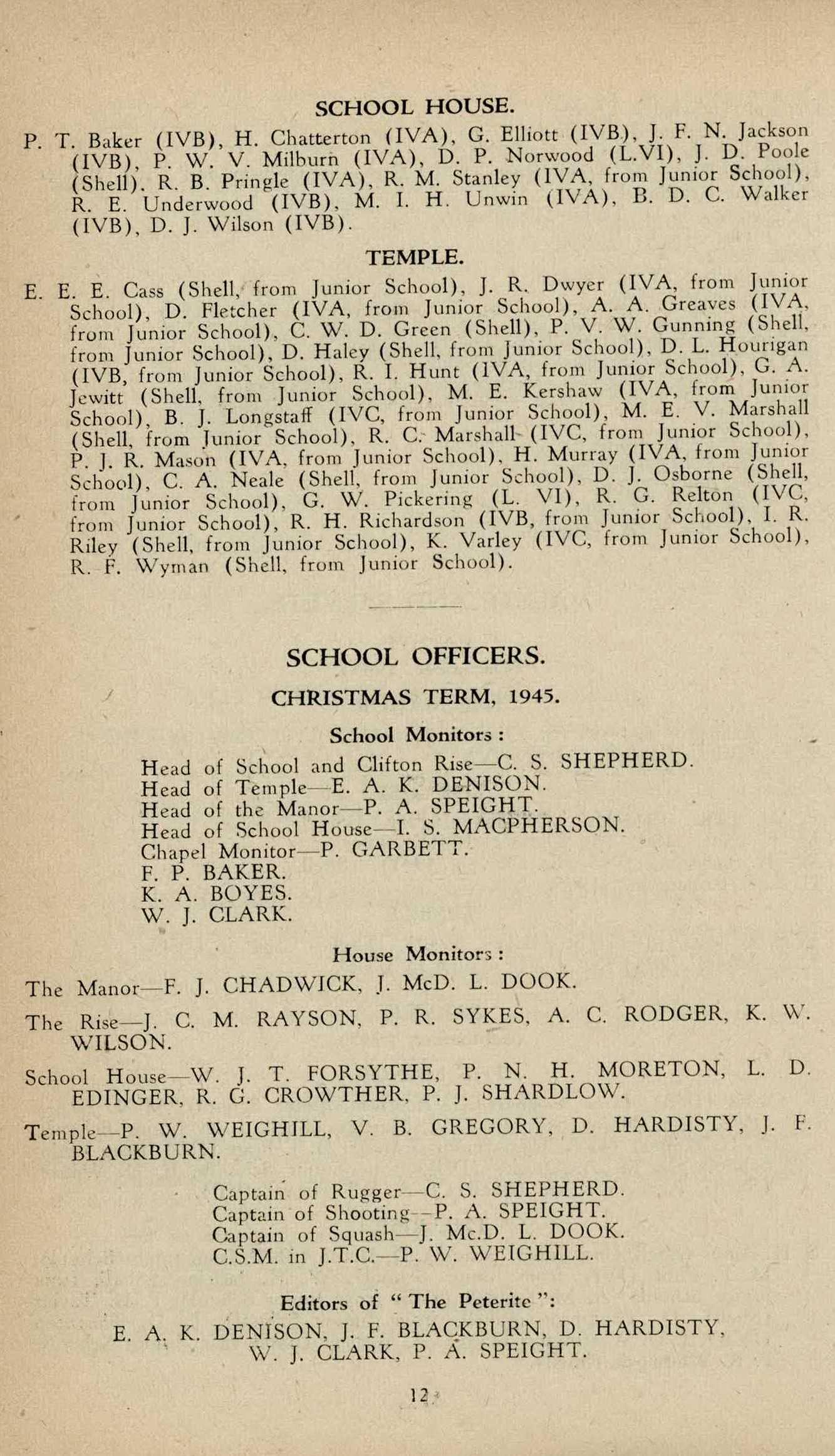
House Monitors : The Manor—F. J. CHADWICK, J. McD. L. DOOK. The Rise—J. C. M. RAYSON, P. R. SYKES, A. C. RODGER, K. W.
WILSON. School House—W. J. T. FORSYTHE, P. N. H. MORETON, L. D.
EDINGER, R. G. CROWTHER, P. J. SHARDLOW. Temple—P. W. WEIGHILL, V. B. GREGORY, D. HARDISTY, J. F.
BLACKBURN.
Captain of Rugger—C. S. SHEPHERD. Captain of Shooting--P. A. SPEIGHT. Captain of Squash—J. Mc.D. L. DOOK. C.S.M. in J.T.C.—P. W. WEIGHILL.
Editors of " The Peterite ": E. A. K. DENISON, J. F. BLACKBURN, D. HARDISTY, W. J. CLARK, P. A. SPEIGHT. 12,
In connection with York's Thanksgiving Week, from 29th September to 6th October, the School held a National Savings Drive, which resulted in the collection of £2,463 10s. Od. The Group, which was started in June. 1940, closed at the end of the Christmas term, having raised the sum of £14,714 14s. 9d. during the five and a half years of its existence.
In October we were visited by Lieut. Burque, of the American W.A.A.C., a school-mistress in New York in civilian life, who was studying English methods of education. She stayed at the School for a fortnight and took a great interest in all our activities. As well as learning something of our educational system, she gave us some idea of the American outlook. During the war, Lieut. Burque had been in Austria with the American Red Cross, fighting the typhus epidemic, and.she gave us some interesting information about present conditions in Germany. We must also thank Lieut. Burque for the two film shows shown on 26th and 30th November, which depicted aspects of life in America and made us realise that America has her social problems, just as we have.
On 30th October the School was given a. lecture by Mr. A. Schonegrevel, of South Africa, on the British Empire and its great traditions. Mr. Schonegrevel was visiting York only for a short time, and it was. a great honour to the School that he found time to visit us. .
On Tuesday, 13th November, Colonel Baxter paid us another visit and gave a talk on the Indian Army, followed by a film portraying life in the Baluch Regiment.
The School paid its annual visit to the Minster on Advent Sunday, 2nd December.
On Tuesday, 27th November, Dr. Richards, of the. D'Arcy Exploration ave us a lecture on geophysics and the methods used to find oil and extract it Co.,irom below the earth's surface. His talk was illustrated by a number of photographs taken in the Persian oilfields.
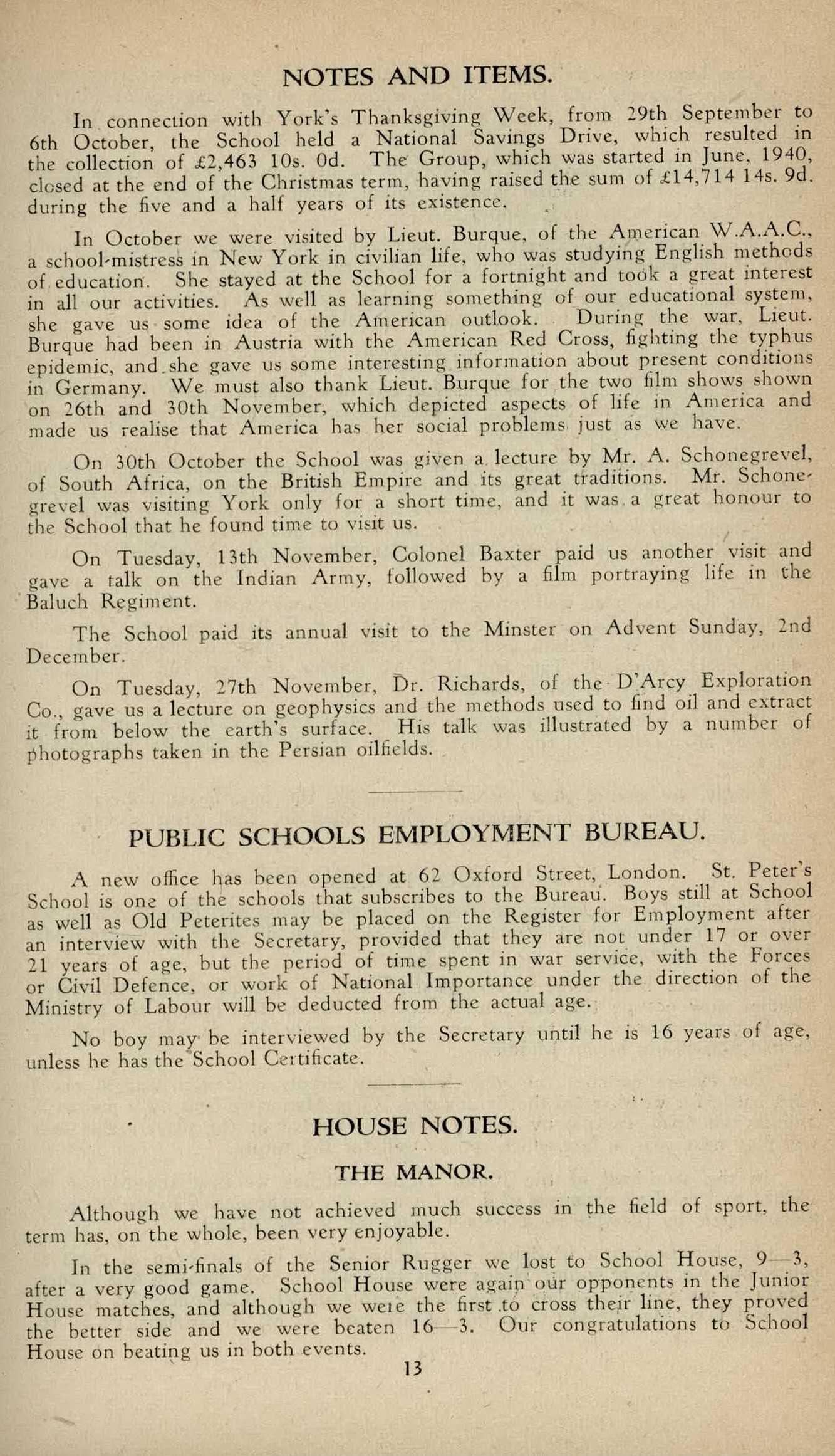
PUBLIC SCHOOLS EMPLOYMENT BUREAU.
A new office has been opened at 62 Oxford Street, London. St. Peter's School is one of the schools that subscribes to the Bureati. Boys still at School as well as Old Peterites may be placed on the Register for Employment after an interview with the Secretary, provided that they are not under 17 or over 21 years of age, but the period of time spent in war service, with the Forces or Civil Defence, or work of National Importance under the direction of the Ministry of Labour will be deducted from the actual age.
No boy may be interviewed by the Secretary until he is 16 years of age, unless he has the'School Certificate.
HOUSE NOTES.
THE MANOR.
Although we have not achieved much success in the field of sport, the term has, on the whole, been very enjoyable.
In the semi-finals of the Senior Rugger we lost to School House, 9-3, after a very good game. School House were again' our opponents in the Junior House matches, and although we were the first .to cross their line, they proved the better side and we were beaten 16-3. Our congratulations to School House on beating us in both events. 13
The Manor was well represented in the 1st XV by Grahim, Drummond, Tomlinson, Reavley and Dook, all of whom are to be congratulated on the award of their 1st XV colours, as is P. Speight on the award of his 2nd XV colours.
Congratulations also to P. A. Speight on his appointment as Head of the House ; P. Garbett on being made a School Monitor ; and to F. J. Chadwick and J. Dook on being made House Monitors.•
We should like to express our thanks here to Mr. Bland, who has so kindly acted as our Assistant Housemaster throughout this term.
Finally, we should like to say " goodbye " to M. Bealing, who is leaving us this term, and to wish him all success in the future. THE RISE.
First we should like to congratulate our new monitors upon their appointments, especially C. S. Shepherd as Head of School and Head of the House, and F. P. Baker as School Monitor.
Although we were unsuccessful in the Senior and Junior Rugger matches this term, both our teams played well. In the Senior event we lost to Temple, 9-3, after a very hard game which' was full of vigour from start to finish ; our Junior-,team also lost to Temple, 3-0, in the semi-finals, but were very unlucky to be beaten, as the whole team played splendidly against a considerably heavier side.
The Rise has been well represented in the School teams. We congratulate Shepherd upon his Captaincy of School Rugger, F. P. Baker upon the award of his cap, and K. W. Wilson and A. C. Rodger on their colours ; also H. L. Dixon, J. H. Amos, P. Tate and J. C. M. Rayson on their 2nd XV colours, and J. E. Stuart on his Colts colours.
We have been pleased to notice the interest shown in School and House affairs by all members of the House, and we hope it will have its due rrevoar4 next term.
Finally, we cannot close without mentioning the impromptu concerts produced by Rodger and his assistants, which filled in, with great success, the empty evenings caused by the School Play. SCHOOL HOUSE.
We take this opportunity to welcome to the House Mr. Howat, whom we feel sure, from our short acquaintance already, will do much to lighten Mr. Rhodes' heavy burden.
There has been some re-arrangement in our accommodation this term. Middles now occupy the old Junior Common Room, the Juniors are in their new Common Room, and there is an additional study, No. 5, where previously we had housed our Senior Middles. -
The House matches this year were very evenly contested, and it was a hard battle for us to retain the Senior cup. The Manor we beat by 9 pts. to 3, and in the final, Temple by 8 pts. to nil. Twelve of the players this year will play next year, a fact which speaks well for the future.
In the semi-final of the Junior House matches we beat the Manor by 16 pts. to 3, and all promised well, and it was very disappointing to see the same team beaten by Temple in a poorer game by 9 pts. to nil.
Our representation in School teams this season has not been as great as usual, but we are a young House, and that will be put right in the fiiture. However, we do congratulate W. J. Clark •upon his Vice-Captaincy and 1st XV cap, and I. S. Macpherson upon his 1st XV cap ; T. M. A. Griffiths, P. N. H. 14
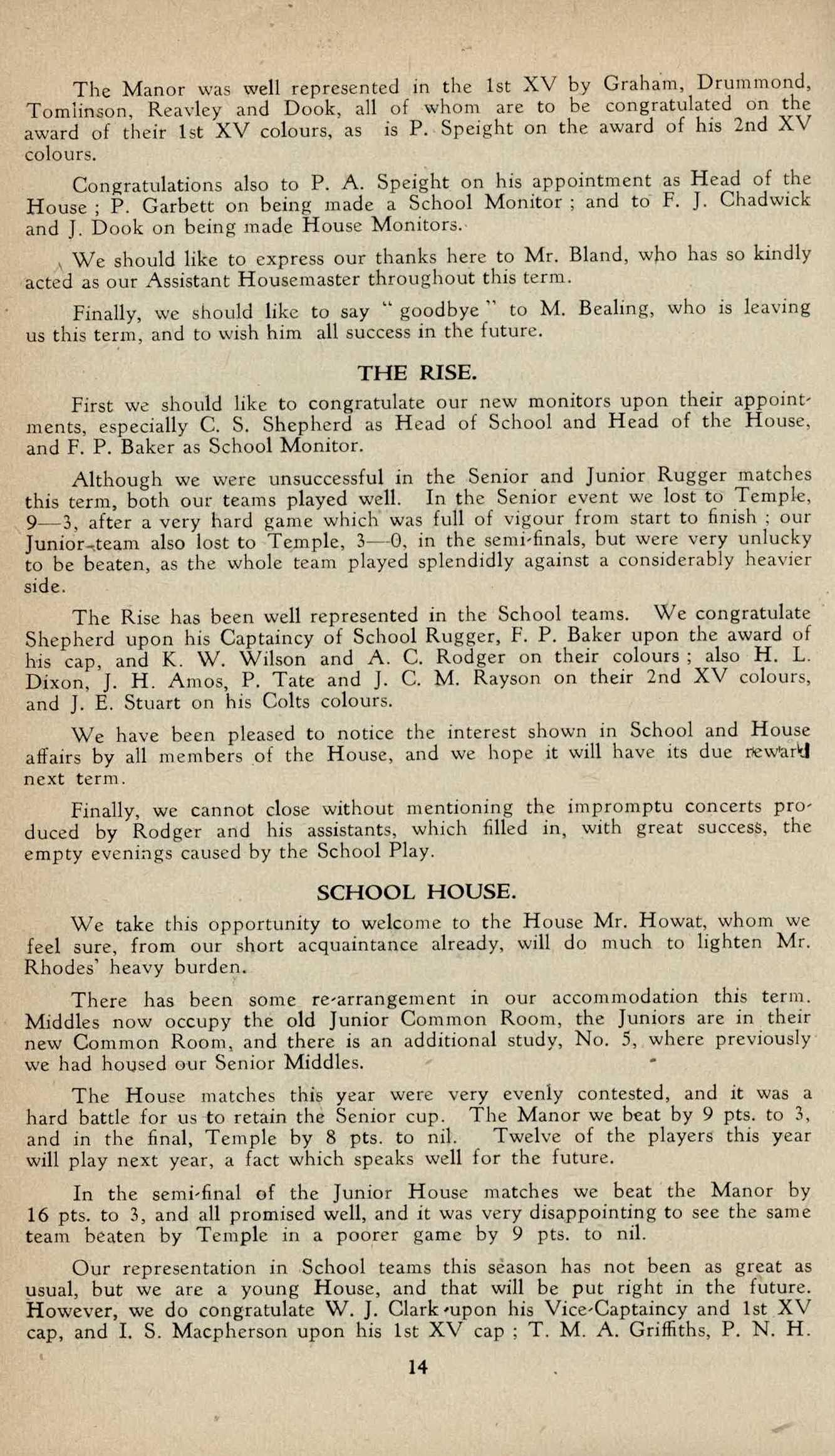
Moreton, W. T. J. Forsythe and P. J. Shardlow upon their 2nd XV colours, and also C. K. Hudson, G. A. Radford, B. Lee and D. Walter upon their Colts colours.
We should like to congratulate the following upon their appointments :— I. S. Macpherson, Head of the House ; W. J. Clark, School Monitor and Captain of Athletics ; W. T. J. Forsythe, P. N. H. Moreton, L. D. Edinger, P. J. Shardlow and R. G. Crowther, House Monitors.
We are not losing any of our members this term and so we look forward to the rest of the School year with high hopes of success.
TEMPLE HOUSE.
The beginning of the School year found our numbers increased to 78, and so we were glad to find that three of our last year's monitors were still with us.
In the realm of games we have had varied success. In the Senior Rugger we beat Rise 9-3 in the semi-finals, after a very even game.. In the final we lost to School House 8-0, and we should like to congratulate School House, on a very fine game. In the Junior Rugger we again beat Rise in the semi-finals, this time 3-0, and then went on to beat School House by 6-0 in the final.
The following are to be congratulated • upon their appointments :E. A. K. Denison, Head of the House and Vice-head of the School ; K. A. Boyes, School Monitor ; V. B. Gregory, D. Hardisty and J. F. Blackburn, House Monitors ; and P. W. Weighill, Captain of Boats.
Congratulations also to:—F. N. Newdick, K. A. Boyes, D. Hardisty and E. A. K. Denison on the award of their 1st XV colours, to V. B. Gregory on his 2nd XV colours, and to P. G. Matthews on his House colours.
Once again we have succeeded in retaining the Work Cup, for which we owe a great deal to G. Mountain and J. F. Blackburn, each of whom obtained a City Major Scholarship, the one in Classics and the other. in Maths.
With such numbers to choose from, we feel that the future holds much in store for Temple, both in sport and work.
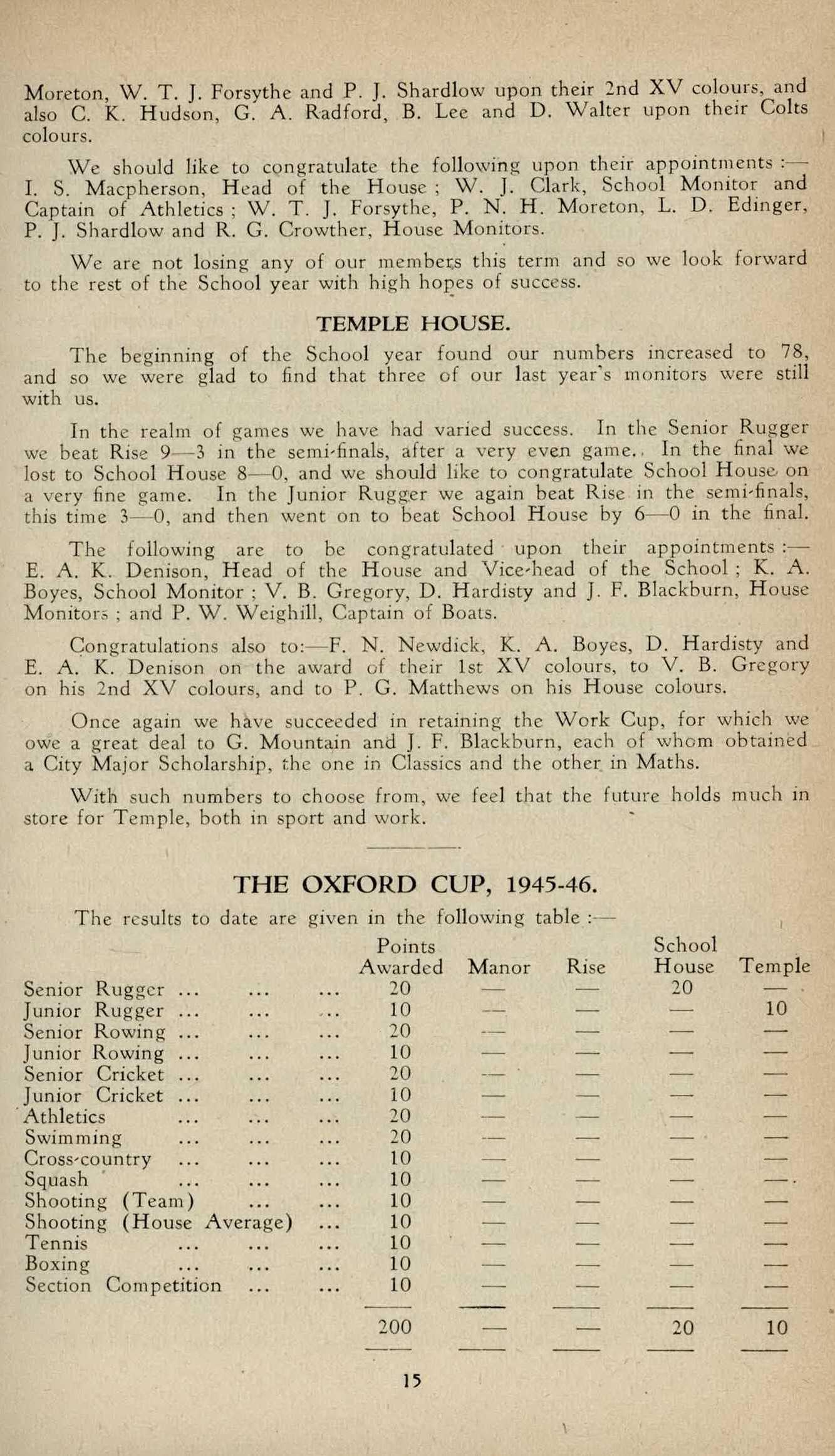
THE OXFORD CUP, 1945 -46.
The results to date are given in the following table :- Points Awarded Manor Rise School House Temple
Senior Rugger ... Junior Rugger ... Senior Rowing ... Junior Rowing ... Senior Cricket ••• 20 — — 20 — •
10 — 10
20 10 20
Junior Cricket ••• 10
Athletics ... 20 —
Swimming ... Cross-country ... Squash ' ... 20 10
10
Shooting (Team) ...
10 Shooting (House Average) 10 Tennis ... ... 10 Boxing ... ... 10 Section Competition ... 10
200
20 10
The visit, on the morning of the 8th November, of the Hon. Sir James Dale Cassels was notable in that it was perhaps the first occasion when the School has been privileged to welcome a member of the King's Bench Division of the High Court of Justice. It was the more enjoyable by its unexpectedness, for the arrangement had been made only the day before.
The opportunity offered itself when His Lordship was in York on the North Eastern Circuit, and he called at the School before proceeding to the City Assizes. He was accompanied by Lady Cassels and Mr. H. E. Harrowell, the Deputy Sheriff of York.
The talk which Mr. Justice Cassels gave in Hall to the assembled School was memorable. An attempt to summarise it in the short space of this note would be doomed to fail, and we can only briefly indicate its scope. We were told something of the dignity and pomp and circumstance which belong to a High Court Judge, not as an individual, but as the representative of the King's Majesty; we learned something of the history of the medieval robes which His Lordship was then wearing (the Black Cap was donned, and its significance explained): and the review of the procedure of the Assize Court, presented as it was from the angle of its presiding genius, had the additional interest of revealing something of the feelings which we knew must lie behind the mask of cold, almost inhuman detachment which is traditionally assumed by Justice. The whole intimate talk (we feel sure that Sir James himself would not have it dignified by the term " address "), liberally spiced by the special brand of legal wit which was new to most of the audience, was enlivened by humorous anecdotes and rounded off with some amusing detail of the lighter side of the life of a judge on Circuit.
We expected that our distinguished guest would have, by his calling, a thorough insight into, at any rate, one aspect of human nature. But in his understanding of the collective mind of the human boy he seemed to us to be unrivalled, and from the first moment of his arrival he established an atmosphere of warm friendliness which remained throughout. Altogether, Mr. Justice Cassel's visit was one which we shall remember with delight. We were indeed grateful to him for a most enjoyable experience, and it was a great satisfaction to us to observe that he obviously enjoyed it himself.
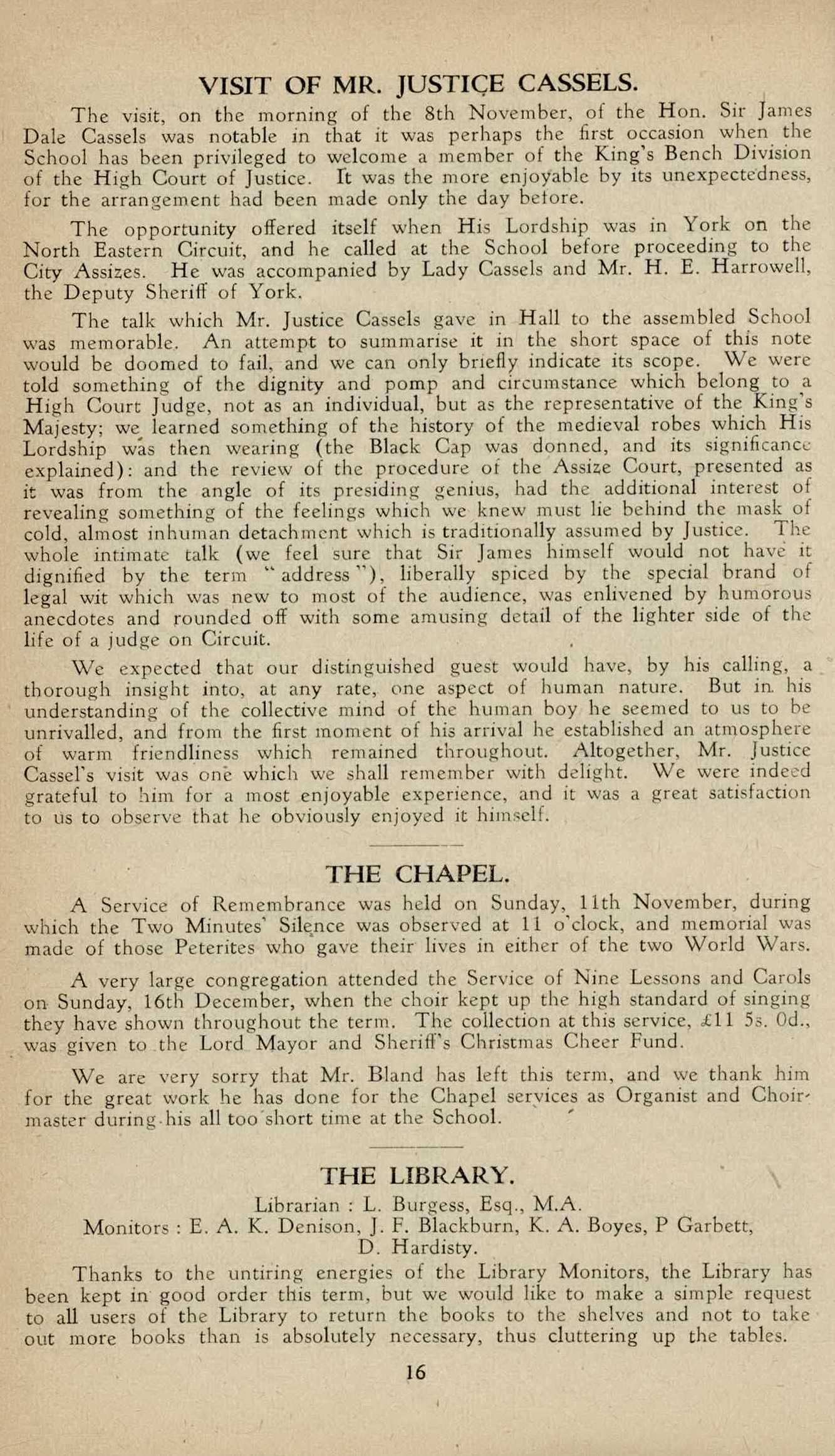
THE CHAPEL.
A Service of Remembrance was held on Sunday, 11th November, during which the Two Minutes' Silence was observed at 11 o'clock, and memorial was made of those Peterites who gave their lives in either of the two World Wars.
A very large congregation attended the Service of Nine Lessons and Carols on Sunday, 16th December, when the choir kept up the high standard of singing they have shown throughout the term. The collection at this service, £11 5s. Od., was given to the Lord Mayor and Sheriff's Christmas Cheer Fund.
We are very sorry that Mr. Bland has left this term, and we thank him for the great work he has done for the Chapel services as Organist and Choir- , master during•his all too"short time at the School.
THE LIBRARY.
Librarian : L. Burgess, Esq., M.A. Monitors : E. A. K. Denison, J. F. Blackburn, K. A. Boyes, P Garbett, D. Hardisty.
Thanks to the untiring energies of the Library Monitors, the Library has been kept in good order this term, but we would like to make a simple request to all users of the Library to return the books to the shelves and not to take out more books than is absolutely necessary, thus cluttering up the tables.
16
The following books have been added to the Library this term :-
Nouveau Petit Larousse Illustre—Ange and Gillet.
World of Engineering—J. L. Dixon.
Wonder of the Waves—Edward Rhein.
Man in a Chemical World--A. Creasy Morrison.
Man of Power—I. B. N. Evans.
Chronique du Regne de Charles IX—Prosper Merimee.
L'Atlantide—Pierre Benoit.
Menaechini—Plautus.
Abraham Lincoln—Lord Charnwood.
An Introduction to Geology—Lord Charnwood.
Zoological Technique—T. L. Green.
Introducing Modern Poetry—W. G. Bebbington.
Textbook of English Literature—Wyatt and Collins.
History of Mathematics, Vols. I and II—Smith.
Principles of Physical GeologyArthur Holmes. •
Yorkshire County C.C. (Records) 1915 , 1928, 1936, 1937 and 1939.
Teaching of Algebra—T. Percy Nunn.
Ascendancy of France—H. 0. Wakeman.
Contemporary Europe and Overseas—R. B. Mowat.
Modern Europe—Alison Phillips.
Our Parliament—S. Gordon.
T.V.A. Lessons for International Application--Herman Finer.
THE DEBATING SOCIETY. President : THE HEADMASTER. Chairman : Mr. R. CALDER, M.A. Secretary : E. A. K. DENISON. Committee :
C: S. SHEPHERD, P. R. SYKES, J. D. SWALE,
W. S. SAMUELS, R. L. HUTCHINSON, R. T. W. McDERMID.
This term, unfortunately, owing to various other arrangements, it was only possible for the Society to hold three meetings. At these meetings there was a fair attendance, but it is felt that the Debating Society could prove to be of very great value to many more boys if only they would take advantage of the facilities which it offers.
The first debate of the term was on Saturday, 20th October, when E: A. K. Denison proposed that - This House approves of the use of the atomic bomb." He claimed ,that the great havoc wrought by the atomic bomb was justified by the subsequent saving of allied life. He went on to say that the use of anything was justified, which would release prisoners from the atrocities perpetrated by the Japanese.
W. S. Samuels opened the opposition to the motion by condemning the atomic bomb on moral grounds. He pointed out that barbarism could not be eliminated by barbarism, and that eventually the use of the atom bomb would prove a stimulant to the Japanese hatred of the democratic powers.
P. R. Sykes, speaking third, said, that all Japanese were evil, and that evil had to be eliminated in the quickest possible manner. He went on to emphasise the fact that the use of the bomb had considerably reduced the total number of casualties there would otherwise have been.
R. L. Hutchinson, seconding the opposition, contended that the use of the atomic bomb was ruthless and entirely against the aims and ideals of democracy. He contended that the atomic bomb did not expedite the end of the war as much as has been suggested.
The motion was carried by 15 votes to 6. 17
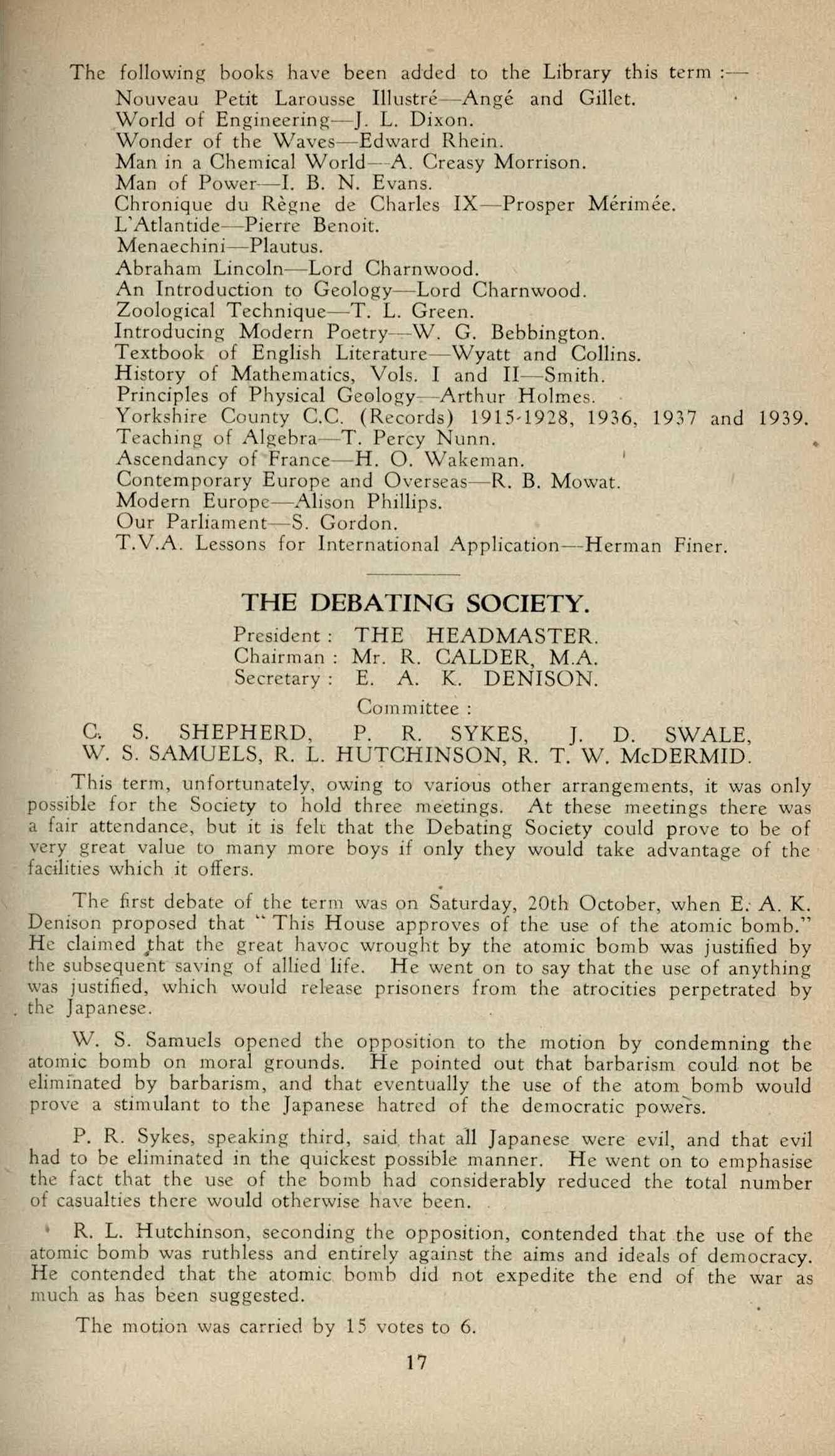
The second debate of the term took place on Saturday, 17th Novembe when C. S. Shepherd proposed that " This House disapproves of the presen magisterial system." He said that in most towns there are so many Justices o the Peace that they are only called upon to serve on the bench at long intervals and so become completely occupied with their own business. To rectify th . he proposed the universal adoption of stipendiary magistrates.
G. R. Claybourn, opposing the motion, pointed out that magistrates are, people recommended by the Lord Lieutenant of the County, and claimed that as they are unpaid, they have no ulterior motive in becoming magistrates. He , then went on to give us various statistics showing the competehce of the magisl trates and their courts.
J. McD. L. Dook, seconding the proposition, claimed that magistrates were too influenced by domesticity, thus becoming too lenient and encouraging crime.; Stipendiary magistrates would check delinquency even if it would mean a slight increase in the rates.
W. S. Samuels, speaking fourth, countered this by saying that an offender's first sentence should not be E0 harsh, as such treatment would embitter the delinquents and not cure them. He said that it was advisable for a magistrate ' to be advanced in years, as his judgment would be more mature.
The motion was carried by 18 votes to 15.
The last meeting of the term was held on Saturday, 7th December, and took the form of an informal discussion on topical events. The subjects which, were discussed included the Government Vote of Censure, the Nuremburg Trials,,, the Moscow Dynamos, and Palestine. Mr. Calder wound up the proceedings by telling the strange story of Henry Brogen.
THE MUSIC SOCIETY.
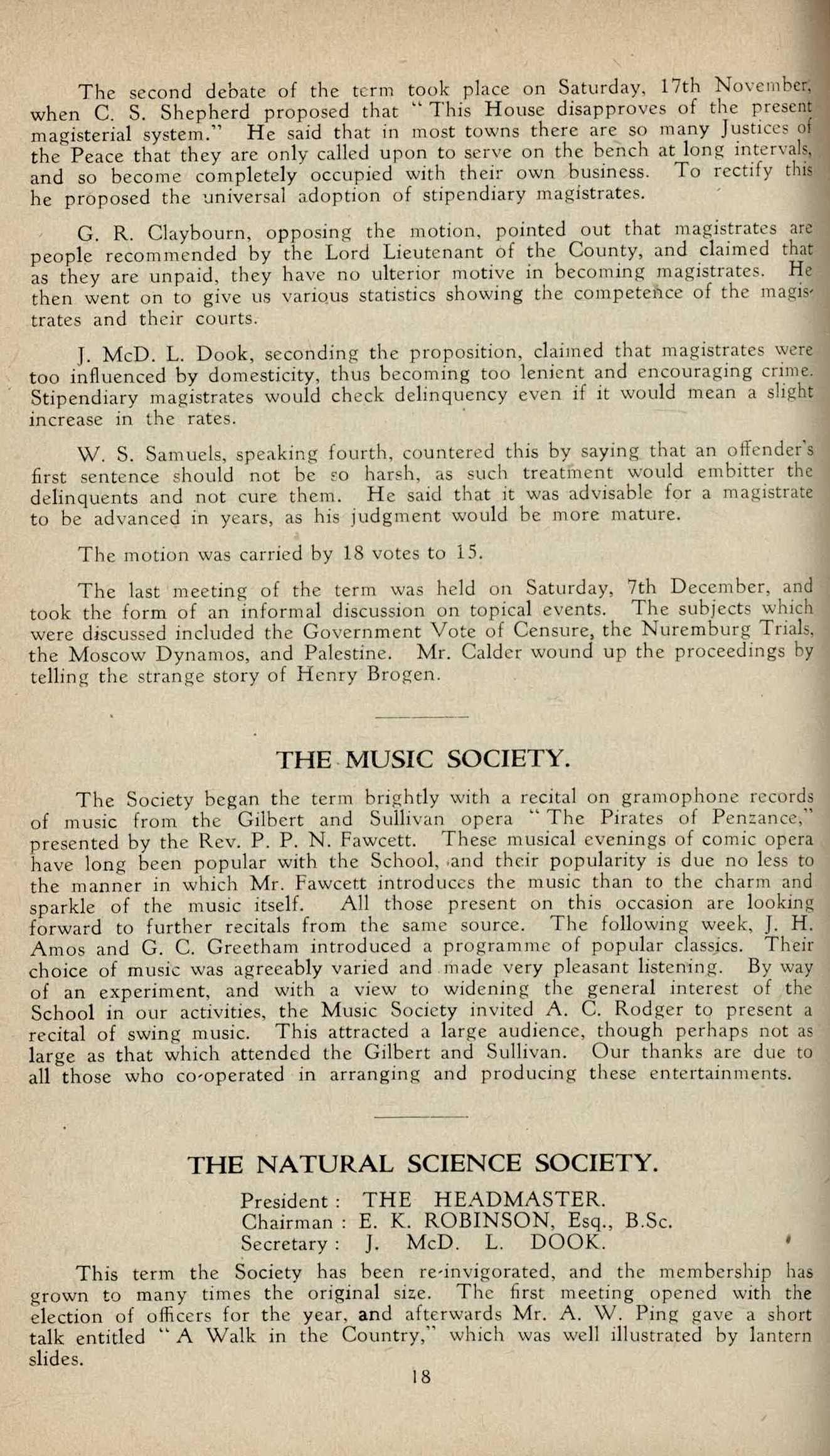
The Society began the term brightly with a recital on gramophone records of music from the Gilbert and Sullivan opera " The Pirates of Penzance," presented by the Rev. P. P. N. Fawcett. These musical evenings of comic opera have long been popular with the School, and their popularity is due no less to the manner in which Mr. Fawcett introduces the music than to the charm and sparkle of the music itself. All those present on this occasion are looking forward to further recitals from the same source. The following week, J. H. Amos and G. C. Greetham introduced a programme of popular classjcs. Their choice of music was agreeably varied and .made very pleasant listening. By way of an experiment, and with a view to widening the general interest of the School in our activities, the Music Society invited A. C. Rodger to present a recital of swing music. This attracted a large audience, though perhaps not as large as that which attended the Gilbert and Sullivan. Our thanks are due to all those who co-operated in arranging and producing these entertainments.
THE NATURAL SCIENCE SOCIETY.
President : THE HEADMASTER. Chairman : E. K. ROBINSON, Esq., B.Sc. Secretary : J. McD. L. DOOK.
This term the Society has been re-invigorated, and the membership has grown to many times the original size. The first meeting opened with the election of officers for the year, and afterwards Mr. A. W. Ping gave a short talk entitled " A Walk in the Country," which was well illustrated by lantern slides.
On 24th November, Mr. T. F. Wall gave a very able talk on " The Atomic Bomb." He mentioned the classical ideas of matter and traced the development of recent ideas, as one scientific discovery followed another; we heard of Becquerel, Mme. Curie, alpha rays, isotopes, heavy hydrogen, neutrons, plutonium, and the rest of the terms so much discussed to-day. We are sorry that Mr. Wall is leaving us, and the Science Society give him their best wishes for the future.
Towards the end of term there was a desire among Senior members for the formation of a Senior Branch, and accordingly one was formed with the following officers :—Chairman : E. K. Robinson, Esq., B.Sc. ; Vice-Chairman ; G. W. Pickering ; Committee : W. H. Andrews (Secretary), F. J. Chadwick, R. Ham, P. Jenkins, J. H. 0. Parker, G. H. F. Reynolds.
THE ART CLUB.
In the course of regular weekly meetings members followed up the kind of work which most interested them. Watson painted a landscape in oils and Burgess was busy with a decorative shipping composition in the same medium. Dench coloured a modelled plaque which he had made previously. Matthews maintained his interest in portraiture, whilst Grove-Stephenson and Pickering were designing posters. March expended much time and care on the building of a model galleon.
A VISIT TO POPPLETON BEET SUGAR FACTORY.
A very interesting visit was paid by the Science Society to this factory on Monday, 10th December. A preliminary talk was given by Colonel R. B. Trollope, and a film shown describing the processes involved in the manufacture of sugar from beet.
This factory uses 1,800 tons of sugar beet a day, making a total of 160,000 tons for the season. The sugar beet comes by rail and road. As each load reaches the factory, it is weighed and a sample is taken from it and put into a tin with a serial number on it, which remains with the sample until it is tested for sugar content. The nett weight of the load, which contains much soil, etc., is arrived at by taking the sample, carefully weighing it, washing the roots and re-topping them if necessary and re-weighing the whole sample. The difference in weight gives the tare which is calculated for the whole load. The percentage sugar content is calculated from the sample by means of a polarimeter. The price of the load is calculated on the percentage sugar content of the sample, which is usually between 15% and 20% .
When the lorry loads have been weighed they are either tipped or emptied by hand into silos. Down the centre of the silos there are flumes along which running water carries the beet to the factory. Railway wagons are emptied by means of strong water jets. Just before the beet enters the factory, a trash and stone trap removes all leaves, grass, etc., and the beet is picked up on a huge wheel and deposited into a washing machine. In the washing machine are great paddles which, together with the warm water, gradually remove all the soil before the beet reaches the other end, where it is thrown on to a travelling belt called a " picking table," on which badly topped beet, stones, horseshoes, etc., are picked out. The beet is hoisted to the top of the factory where it is mechanically re-weighed into batches of 11 tons before passing into the slicing machine. The slices are steel vats containing sets of corrugated knives that slice the beet into V-shaped strips called cossettes. The cossettes are then passed into the lower ends of the diffusers, long tilted cylinders through which hot water is passed. Inside the diffusers there are tilted vanes which rotate. Here the hot water dissolves most of the sugar from the beet. These cossettes, having had their sugar taken out, emerge from the diffuser into presses, where they are dried in rotary kilns and then bagged up for valuable cattle food.
Meanwhile, the sugar solution that is obtained from one diffuser is passed into another, where it becomes more concentrated. This " thin juice," as it is 19
